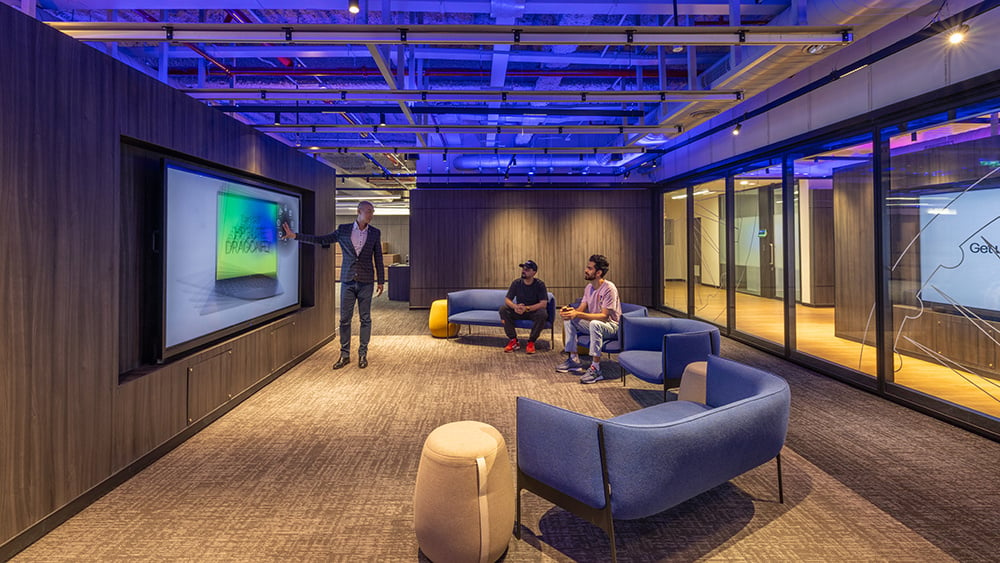The AI Revolution in Corporate Real Estate: Transforming the Industry Through Technology l Swatasiddha Majumdar Speaks to CoreNet Global Part 3

Following the first AI article on the transformative workplace potential in 2044, CoreNet Global featured Swatasiddha Majumdar, Principal of Strategy at Unispace India, for his second piece, exploring the power of AI-powered mindfulness apps in shaping the workplace of tomorrow—transforming employee well-being, driving productivity, and paving the way for a healthier, more resilient workforce.
Now, in this third installment, we delve into the AI revolution in corporate real estate, a transformation unfolding at an unprecedented pace.
Artificial intelligence is reshaping corporate real estate at an unprecedented pace, with global AI investments soaring to $19.8 billion in 2024 and projected to reach $24.5 billion by the end of 2025. As AI adoption accelerates across markets, businesses are leveraging technology to enhance efficiency, optimize operations, and redefine workplace strategies for a smarter future.
Regional Adoption and Market Trends
The AI revolution is unfolding at different speeds across regions, with North America leading at $15.2 billion in investments, followed by Europe ($8.9B) and Asia-Pacific ($5.8B). Notably, India has emerged as a key player, reaching $2.8 billion in AI investments, transforming major metropolitan hubs like Bangalore, Mumbai, and Delhi-NCR.
- Bangalore: 88% adoption rate in IT corridors, 90% integration in tech parks
- Mumbai: 82% adoption in BKC, 80% in Worli, and 78% in Lower Parel
- Delhi-NCR: 85% adoption in Gurugram, 82% in Noida, and 78% in Delhi CBD
Across these markets, AI-driven solutions have led to a 45% improvement in space optimization, a 48% boost in energy efficiency, and a 38% reduction in operating costs.
AI-Powered Transformation in Key Sectors
AI implementation is revolutionizing the IT/ITES, financial services, and mixed-use development sectors:
- IT/ITES: Space optimization (+45%), energy efficiency (+48%), ROI timeline (1.8 years)
- Financial Services: Smart building adoption (92%), cost reduction (35%), employee satisfaction (+48%)
- Mixed-Use Developments: Occupancy management (+52%), resource optimization (+45%), revenue enhancement (+38%)
Singapore and Japan are also seeing rapid AI integration, with enterprise-level adoption rates exceeding 82%, leading to a 35-42% reduction in operational costs.
 Global Financial Institution, Singapore
Global Financial Institution, Singapore
Technology Integration and Performance
Organizations investing in AI-driven smart building systems and space management solutions are seeing tangible benefits:
- Smart Building Systems: 95% adoption in access management, 92% in lighting control
- Space Management: 92% occupancy tracking, 88% desk booking, 95% meeting room management
Performance metrics reflect AI’s transformative impact:
- Space utilization: +38-52%
- Energy efficiency: +35-48%
- Staff productivity: +32-45%
- Cost reduction: 32-42%
Case Studies: Real-World Impact of AI Adoption
Leading enterprises are harnessing AI to achieve remarkable results:
- Fortune 500 Technology Company: $58M AI investment across 4.5M sq. ft., achieving 85% space utilization (from 48%), 52% energy efficiency gains, and a 325% ROI in 18 months
- European Banking Consortium: €42M AI deployment, yielding 42% space reduction, €22.5M in annual savings, and 92% employee satisfaction
Future Outlook: The Road Ahead for AI in Corporate Real Estate
As the industry advances, AI will be further integrated with quantum computing and advanced neural networks, unlocking:
- Quantum computing applications for predictive analytics (2026-2028)
- Neural networks with 2T+ neurons, enhancing autonomous evolution
- Global AI market growth reaching $68.5B by 2030
By 2030, enterprise adoption is expected to hit 99%, with mid-market and small business adoption reaching 92% and 85%, respectively.
Implementation Strategy: A Phased Approach
Successful AI integration requires a structured rollout:
- Initial Phase (0-4 months): Infrastructure assessment, core system development, AI integration
- Advanced Integration (4-8 months): AI deployment, process automation, advanced analytics
- Optimization Phase (8-12 months): Performance tuning, system integration, advanced feature enhancements
Financial and Operational Benefits
AI adoption is delivering strong financial returns:
- Class A Properties: Initial investment of $5.85/sq. ft., ROI within 12-18 months, annual savings of $3.2-$6.8M
- Operational Gains: Energy cost reduction (52%), maintenance cost savings (45%), staff efficiency improvement (58%)
- Revenue Growth: Occupancy rates (+42%), rental premiums (+18%), service income (+35%)
Conclusion: A Future-Ready Industry
The AI revolution in corporate real estate is no longer a concept—it’s a competitive necessity. With implementation timelines shrinking and ROI consistently exceeding 300%, forward-thinking organizations are reimagining their workplaces with AI-driven strategies.
The key to success? A combination of strategic vision, technical expertise, and a relentless focus on human-centric innovation. As AI reshapes the industry, businesses that embrace intelligent solutions will lead the charge in creating future-ready work environments.
About Swatasiddha Majumdar, Principal, Strategy, India

Swatasiddha Majumdar is the Principal, Strategy at Unispace India, a global design and build firm that specializes in workplace strategy, design, project management, and construction. With over two decades of professional experience, Swatasiddha leads the strategic initiatives at Unispace, where he focuses on architecture, workplace strategy, and project integration management.
He holds a Bachelor of Architecture & Planning from the Indian Institute of Technology, Roorkee (1996-2001) & Postgraduate in Advanced Programme in Product Marketing from Indian Institute of Management, Calcutta.
Follow Swatasiddha Majumdar on LinkedIn.





